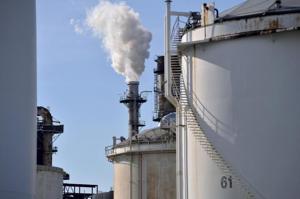Troubled California oil refinery puts PBF's turnaround skills to the test
HOUSTON (Reuters) -- An aging California refinery is testing PBF Energy Inc's reputation as a turnaround whiz, with mounting production woes and costly repairs at the 88-year-old plant throwing a wrench into efforts to quickly revive profits.
The refinery, acquired from ExxonMobil Corp for $537.5 MM, has reported frequent breakdowns since the deal closed last July. On April 1, a regional air-quality regulator expects to consider the plant's frequent breakdowns and emissions, along with a plan to enhance safety with an expensive phase out of a chemical used in gasoline production.
PBF is spending $100 MM this year to improve operations, and is budgeting another $50 MM for upgrading its electric power to prevent outages. Phasing out the use of modified hydrofluoric acid at the plant presents a potentially larger bill that was not on the table when PBF bought the refinery last July.
This week, the company lowered its estimate of first-quarter crude throughput at Torrance by 16%. It has said the overhaul would allow the Torrance refinery to boost production and hit profitability goals. "These things will be fixed," PBF Chief Executive Tom Nimbley assured analysts on an earnings call last month.
The problems are weighing on earnings. Last year, the company missed its earnings goals due at least partly to outages at Torrance and at PBF's Delaware City, Del., refinery. It posted an operating loss of $61.7 million in the fourth quarter compared with earnings of $168 MM a year earlier.
"We left $75 MM on the table in the fourth quarter and more than $300 MM in terms of lost profit opportunities for the year," Nimbley said, discussing fourth quarter results.
The push to phase out hydrofluoric acid, widely used in refining and semiconductor industries, came after a tank holding the chemical suffered a "near miss" from a 2015 explosion, according to a federal probe of the blast.
Hydrofluoric acid can form a toxic cloud at room temperature and exposure can cause severe health problems and lead to death. An estimated 330,000 people live or work near the refinery.
The South Coast Air Quality Management District may push to adopt a rule to phase out use of the acid by December. A study commissioned by the air regulator estimated switching to sulfuric acid would cost around $100 million for each of the refineries in the region that use it.
PBF said in a statement that figure was "exceptionally low," and called a switch to sulfuric acid for gasoline output cost-prohibitive. A company executive has said the switch could worsen the plant's emissions.
A refiner in Texas is building a similar unit for $300 MM.
"I see no way they could avoid doing the upgrade if they wanted to stay in the gasoline business," said Robert Campbell, an analyst at consultancy Energy Aspects.
Acquisitions made PBF the fourth largest independent refiner in the United States. It proved its skills by buying a Delaware City refinery, overhauling it and quickly cutting annual expenses by $200 MM.
But the Torrance deal was troubled from the start. Closing was contingent on the plant running 15 days straight without a breakdown, but PBF went ahead despite an incident 10 days ahead of closing, saying it was not material and Exxon covered repair costs.
SULFUR EMISSIONS
Local residents are pressuring elected officials and PBF due to noticeable gas-flaring and emissions.
Last year, the facility released 487 tons of sulfur oxide, nearly 20 times greater than Valero Energy Corp, Southern California's second biggest polluter, which released just under 25 tons, according to figures from SCAQMD, which may be subject to revisions.
PBF disputes the regulator's figures. It said 16 tons of the sulfur releases were under its ownership. It expects that figure to decline to less than 4 tons if its requests for revisions are upheld.
"They will turn things around eventually," said a person familiar with the plant, adding: "It's going to take time."
Investors are not patient. In the last year, PBF's share price has slid 35.1% to $21.11 per share, more than peers Tesoro, which is down 9%, or Valero, which is up 1.6% over the same period.
Reporting by Liz Hampton, Jessica Resnick-Ault, Jarrett Renshaw; Editing by Gary McWilliams and David Gregorio







Comments